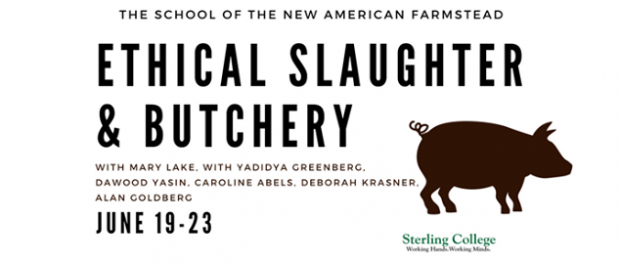Ethical Slaughter and Butchery Summer Course

Study “Ethical Slaughter and Butchery” with Dr. Temple Grandin at Sterling College
For many mindful eaters and conscious carnivores, rejecting industrial meat doesn’t require them to reject meat eating. Truly sustainable meat production calls for a moderate, respectful, and solemn perspective that centers the animal’s well-being and seeks to minimize environmental harms. The School of the New American Farmstead at Sterling College is offering the course “Ethical Slaughter and Butchery” for those looking to explore how to safely, ethically, and humanely bring our livestock from the field to the table.
This five-day course, held June 19-23, 2017, will combine dialogue, presentations, and debate with observational slaughter and hands-on butchery of several species of livestock. The class also features perspectives on slaughter and butchery from two major religious traditions: Judaism and Islam. The class will spend a day on shechita (kosher slaughter) and Jewish understandings of the human-animal relationship. The class will also study halal, Islamic laws pertaining to animal consumption, and differences in halal practices over time and at varying scales.
The Ethical Slaughter and Butchery class will feature a single half-day master class with Dr. Temple Grandin, animal scientist, researcher, and award-winning author. Grandin will apply her groundbreaking approach to decoding animal behavior to small farms, identifying and addressing the special needs and challenges of these livestock operations. Grandin, the author of the recently released Temple Grandin’s Guide to Working with Farm Animals: Safe, Humane Livestock Handling Practices for the Small Farm, will bring her explanations of how herd animals think and methods for analyzing their behavior.
“Animal abuse is inherent in modern factory farming, so it is up to the small and mid-size farmer to incorporate respectful, ethical ways to raise animals for consumption,” says Dr. Alan Goldberg, one of the instructors in the course. Goldberg is a professor of toxicology at Johns Hopkins University and the Founding Director (emeritus) of the Johns Hopkins Center for Alternatives to Animal Testing. Starting in 2007, Dr. Goldberg served as a Pew Commissioner on the study of the impact of U.S. industrial farm animal production, on issues of public health, environment, animal welfare, and social justice. “Animals need freedom from distress, pain, and fear, as well as the ability on the farm to express natural behaviors.”
The Ethical Slaughter and Butchery course will be led by Mary Lake, a shearer, butcher, and shepherd based in Tunbridge, Vermont. She is a former full-time butcher at The Royal Butcher, and is now an itinerant on-farm slaughterer for hire, processing sheep, goats, pigs, and small bovines.
Lake’s teaching will be augmented by robust interrogation on the ethics of meat production and consumption with a panel of experts and in class discussion.
Other instructors include: Yadidya Greenberg, the Kosher Meat & Animal Welfare Specialist at the Jewish Initiative for Animals; Dawood Yasin, the Director of Student Affairs at Zaytuna College, the first Muslim liberal arts college in the United States; and Caroline Abels, a journalist focusing on issues related to local agriculture and the humane treatment of farm animals and the founder of the website Humaneitarian, as well as a regular contributor to Civil Eats.
The Ethical Slaughter and Butchery class is being offered at Sterling College as part of the School of the New American Farmstead, its continuing education program that provides a variety of classes and workshops for aspiring agrarians, artisan food enthusiasts, and environmental stewards. These hands-on short courses in small-scale food production and sustainable farming offer one-on-one mentorship, inspiration, skills, and new perspectives that will feed the body, the mind, and the spirit.
This is the second year of the visionary School of the New American Farmstead, the creation of President Matthew Derr. Under President Derr’s leadership, the College has launched the Rian Fried Center for Sustainable Agriculture & Food Systems; made substantial progress on renewable energy; transformed its agricultural facilities; and set records for enrollment and fundraising.
The School of the New American Farmstead at Sterling College is generously underwritten by two great Vermont businesses: Chelsea Green Publishing, the preeminent publisher of books on the politics and practice of sustainable living, and Vermont Creamery, an award winning creamery offering fresh and aged goat cheeses, cultured butter, and créme fraîche that combine the European tradition of cheesemaking with Vermont’s terroir. Both Chelsea Green and Vermont Creamery are partner businesses that share a deep commitment to the environmental stewardship mission of Sterling College.
Online registration for the Ethical Slaughter and Butchery Course is now open, but spaces are limited. Students are encouraged to apply as early as possible. Academic credit is available for all courses. For more information this course and to register, visit www.sterlingcollege.edu/ethicalslaughter.








 Your Privacy Choices
Your Privacy Choices
Leave a comment